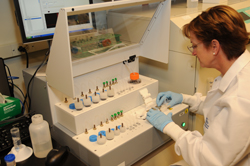Genomics will aid primary care, with primary care's help
Genomics expert W. Gregory Feero, MD, PhD, interviews Eric Green, MD, PhD, the new director of the National Human Genome Research Institute, about the changing interface between genomics and medicine.
Eric Green, MD, PhD, took the helm as the new director of the National Human Genome Research Institute (NHGRI) at the National Institutes of Health (NIH) late last fall. I caught up with him recently, and took the opportunity to get a better understanding of his views about the changing interface of genomics and medicine.
Dr. Green succeeds Francis Collins, MD, PhD, as the director of NHGRI. He assumes this leadership position at an extremely exciting time for the field of genomics, but during a challenging period for health care in general. He obtained his degrees from Washington University in St. Louis, Mo., and completed training as a clinical pathologist. A 15-year veteran of NHGRI, he previously served as the director of the Division of Intramural Research, NHGRI's internal faculty performing independent genetics and genomics research.

Dr. Green told me that his new role brings him full circle in his career. Early on, he had a driving interest in medicine and clinical diagnostics. During his tenure as an active genome scientist, he worked to unravel the mysteries of the human genome. And in his new role, he aims to use this growing knowledge for improving human health.
Q: What have been some of the most exciting advances in genomics that are relevant to physicians over the last 12 months?
A: Close to the top would be advances in cancer genomics resulting from the full-court press of tumor sequencing being performed by The Cancer Genome Atlas (TCGA) project. We are beginning to unravel the complex biology underlying devastating cancers like glioblastoma multiforme. From this improved understanding, we hope to develop more rational approaches for therapeutic design.
In other developments, the continued outpouring of discoveries from genome-wide association studies have provided new insights about the genetic underpinnings of a diverse array of common conditions that clinicians see every day. More specific to the NIH, we have seen a major growth in the agency's Undiagnosed Diseases Program, which is allowing patients with rare and enigmatic conditions access to the research expertise of the NIH Clinical Center. This resource offers hope to patients who previously might have never received a diagnosis or effective treatments. It is also yielding knowledge about new diseases.
Q: What are some areas in genomics that NHGRI will address in the next 12 months?
A: NHGRI continues to support the development of low-cost DNA sequencing technologies. The ability to sequence people's genomes inexpensively will be critically important for the next stage of studies aiming to understand the genetic basis of disease. For example, while genome-wide association studies have provided valuable clues about the locations in our genomes harboring variants that confer risk to common diseases, we still need to precisely identify those variants.
Furthermore, we are learning that the genetic disease risk defined by single-nucleotide variants often only accounts for a small portion of the overall heritable disease risk. The missing risk, or so-called “dark matter” in the genome, very likely reflects very rare variants as well as structural variants. We will need to sequence many, many human genomes to sort out all of these complex issues.
Finally, it is important to mention that NHGRI is developing a new strategic plan for genomics research, a sequel to the one published in Nature in 2003. We aim to publish our new plan in late 2010, and it will include a much heavier emphasis on clinical applications of genomics than we have proposed in the past.
Q: What are some areas of genomics that practicing physicians should watch over the next few years?
A: One of the first areas to watch is pharmacogenomics. There are already several excellent examples of its use for specialty care. I believe that pharmacogenomics will soon make inroads in primary care environments. For example, NHGRI is collaborating with the National Heart, Lung and Blood Institute to evaluate genetic testing to help guide warfarin dosing. Results of this trial will be influential in deciding whether or not pharmacogenomic-based tests become the standard of care when prescribing it.

I would also watch how low-cost DNA sequencing begins to play a role in medical care. Here at NHGRI, we have ClinSeq™, which is examining the practicality of using genome sequencing to assess the risk for common conditions like cardiovascular disease. These same new sequencing technologies are also the driving force behind the NIH Human Microbiome Project, which is already making discoveries about the microbial life on and inside each of us. Those discoveries will likely teach us the clinical relevance of previously unknown, often unculturable microbes that turn out to play roles in different diseases.
Another area to watch will be new approaches to drug development. NHGRI, the NIH Chemical Genomics Center and the NIH Roadmap's Molecular Libraries Program are all gearing up to develop new high-throughput approaches to identify candidate drugs for rare and often-neglected conditions.
Q: What role will primary care physicians play in the implementation of genomic advances in health care over the coming decades?
A: Primary care providers are the front lines in what will have to be an integrated and collaborative model for using genomic advances to enhance patient care. More effective genetics and genomics education of health care providers will be an extremely important component. However, it is unlikely that any one type of care provider, no matter how specialized or highly trained, will be able to know all that there is to know about the relationships between genetic variation and human health and disease. Effective partnerships and the use of electronic tools for making clinical decisions will be key to the effective implementation of genomic discoveries across the spectrum of health care.



